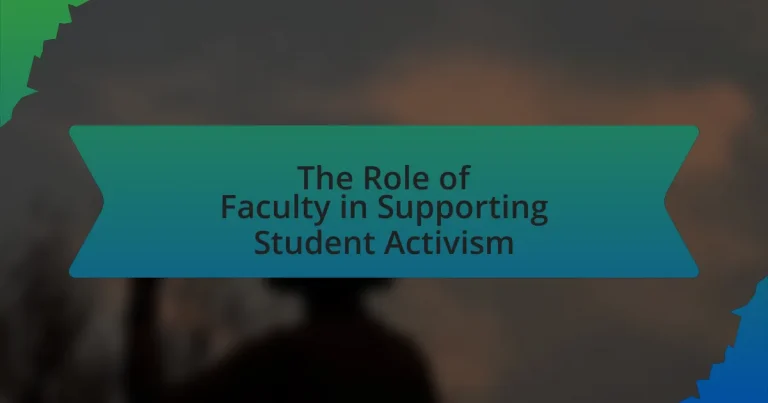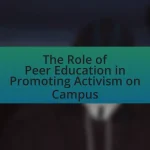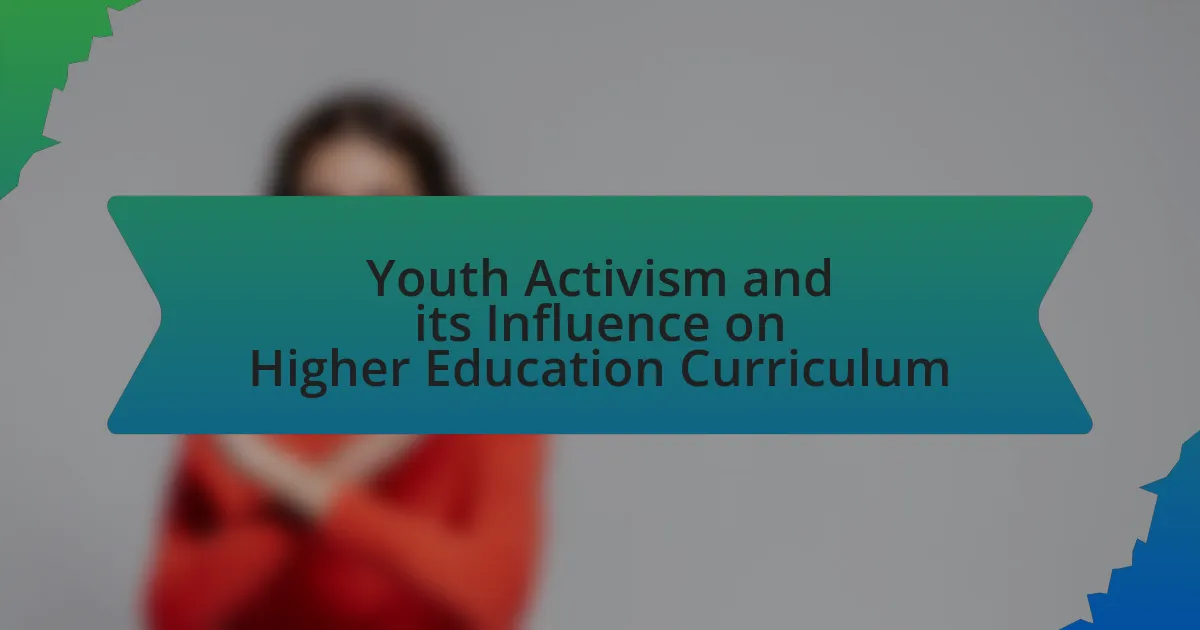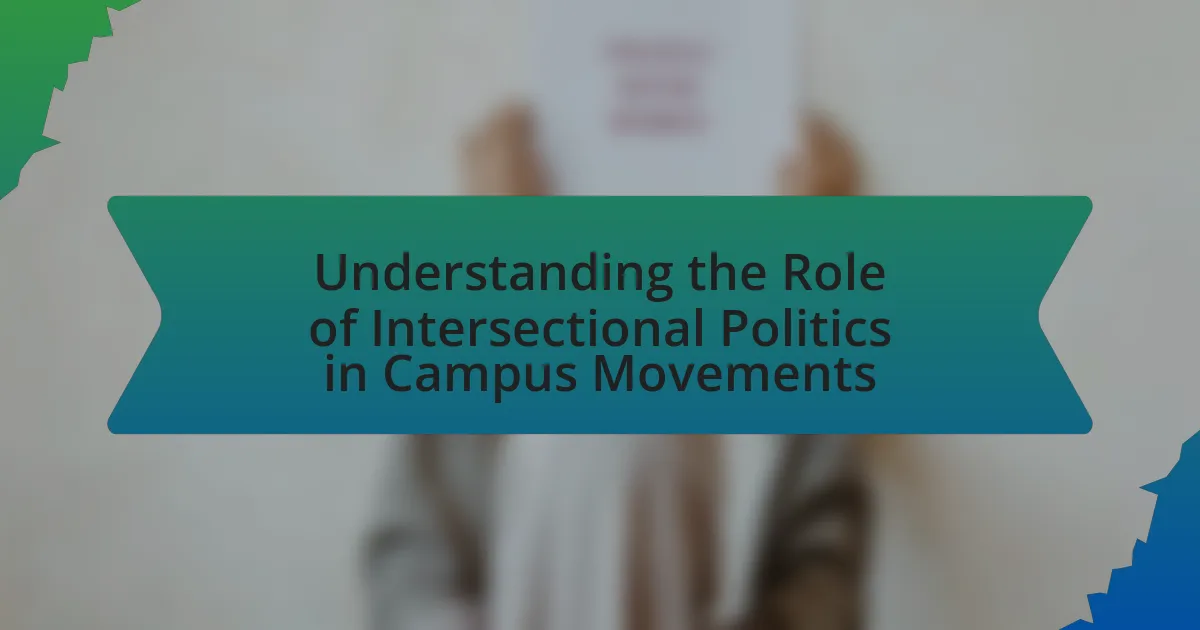The article examines the critical role of faculty in supporting student activism within academic institutions. It highlights how faculty members provide mentorship, facilitate discussions, and advocate for student concerns, thereby enhancing the educational experience and fostering civic engagement. Key topics include the influence of faculty on student activism, specific actions they take to support student-led initiatives, the challenges they face, and the ethical considerations involved in their involvement. The article also discusses strategies for creating inclusive environments that empower diverse student voices and the importance of integrating social justice themes into the curriculum to promote activism.
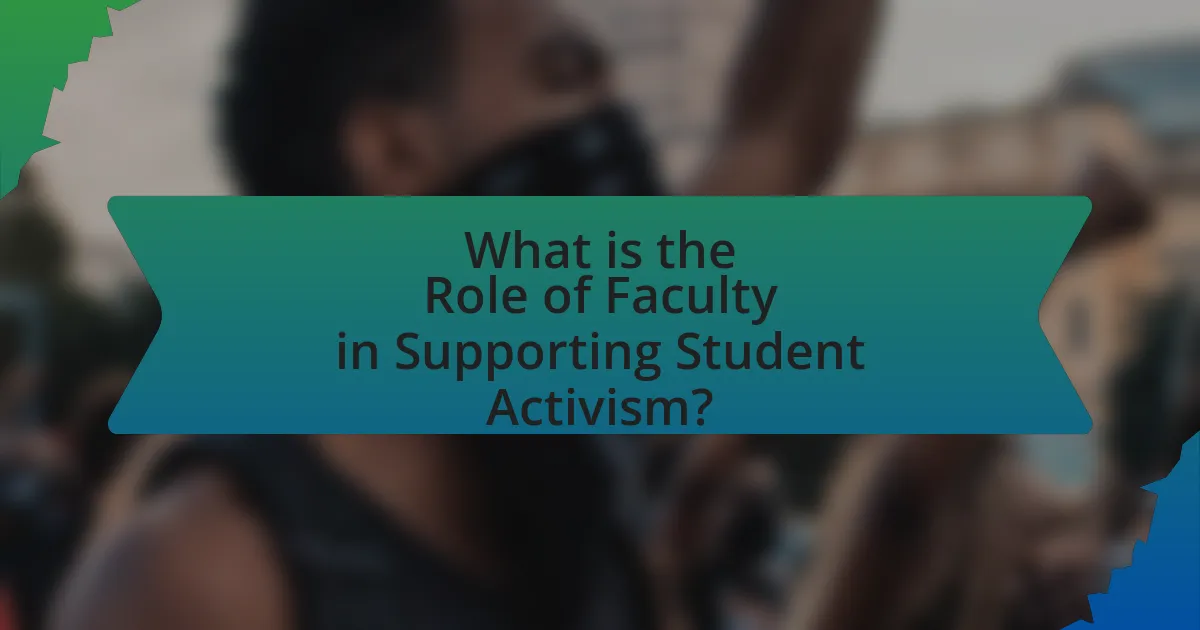
What is the Role of Faculty in Supporting Student Activism?
Faculty play a crucial role in supporting student activism by providing mentorship, facilitating dialogue, and advocating for student concerns within the institution. Faculty members can guide students in developing their activism skills, helping them to articulate their goals and strategies effectively. Additionally, faculty can create inclusive environments that encourage open discussions about social issues, thereby empowering students to engage in activism. Research indicates that faculty involvement in student-led initiatives enhances the educational experience and fosters a culture of civic engagement on campus, as seen in studies conducted by the American Association of University Professors, which highlight the positive impact of faculty support on student activism outcomes.
How do faculty members influence student activism on campus?
Faculty members influence student activism on campus by providing mentorship, facilitating discussions, and integrating social justice themes into the curriculum. Their guidance helps students develop critical thinking skills and encourages them to engage in activism. For instance, research by the American Association of University Professors indicates that faculty involvement in social issues can significantly increase student participation in activism, as students often look to faculty for leadership and validation of their concerns. Additionally, faculty can create supportive environments that empower students to voice their opinions and organize events, further enhancing the impact of student activism on campus.
What specific actions do faculty take to support student-led initiatives?
Faculty support student-led initiatives by providing mentorship, facilitating resources, and advocating for student voices within institutional frameworks. Faculty members often engage in one-on-one mentoring sessions to guide students in developing their initiatives, ensuring they have the necessary skills and knowledge. Additionally, they may assist in securing funding or access to facilities, which are crucial for the execution of these initiatives. Research indicates that faculty advocacy can significantly enhance the visibility and impact of student-led projects, as they often have established networks and influence within the institution. For example, a study published in the Journal of Higher Education found that faculty involvement in student activism leads to increased student engagement and successful outcomes for initiatives.
How do faculty members serve as mentors for student activists?
Faculty members serve as mentors for student activists by providing guidance, resources, and support to help them navigate their activism effectively. They offer expertise in areas such as social justice, policy analysis, and community organizing, which enhances the students’ understanding of complex issues. Additionally, faculty members often facilitate connections with relevant organizations and networks, enabling students to broaden their impact. Research indicates that mentorship from faculty can significantly increase student engagement and success in activism, as seen in studies highlighting the positive correlation between faculty involvement and student leadership development.
Why is faculty support crucial for effective student activism?
Faculty support is crucial for effective student activism because it provides students with the necessary resources, mentorship, and legitimacy to amplify their voices. Faculty members often have established networks, institutional knowledge, and experience that can guide students in organizing and advocating for their causes. For instance, research indicates that when faculty actively engage with student movements, it enhances the visibility and impact of those movements, as seen in the 2016 University of Missouri protests, where faculty solidarity significantly influenced administrative responses. Thus, faculty involvement not only empowers students but also legitimizes their activism within the academic community.
What impact does faculty endorsement have on student movements?
Faculty endorsement significantly enhances the credibility and visibility of student movements. When faculty members publicly support student activism, it legitimizes the students’ causes and attracts broader attention from the administration and media. For instance, during the 2018 student-led March for Our Lives movement advocating for gun control, numerous faculty members at various universities endorsed the initiative, which resulted in increased participation and media coverage. This endorsement often leads to greater institutional support, as faculty can leverage their positions to advocate for policy changes and provide resources, thereby amplifying the impact of student movements.
How does faculty involvement enhance the legitimacy of student activism?
Faculty involvement enhances the legitimacy of student activism by providing academic credibility and institutional support. When faculty members actively participate in or endorse student-led initiatives, it signals to the broader community that the concerns raised by students are valid and worthy of attention. Research indicates that faculty engagement can lead to increased visibility for student movements, as seen in the 2018 student protests for gun control, where faculty support amplified the message and drew media coverage. This collaboration fosters a sense of shared purpose and reinforces the idea that student activism is not just a fleeting trend but a significant societal issue that merits serious consideration.
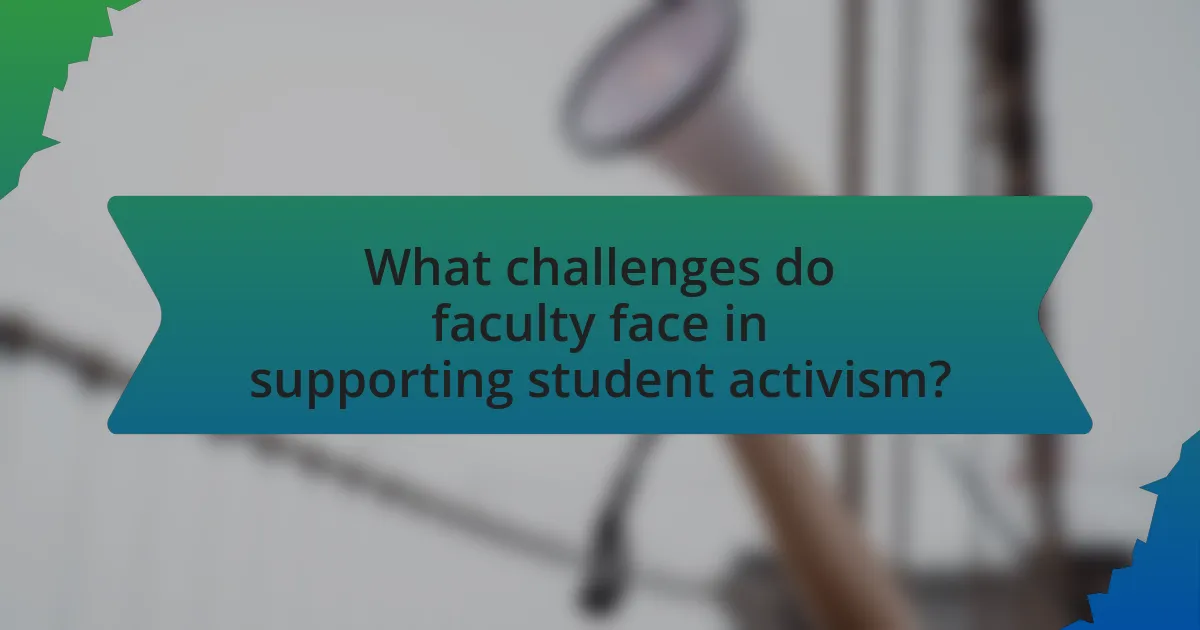
What challenges do faculty face in supporting student activism?
Faculty face several challenges in supporting student activism, including institutional constraints, potential backlash, and balancing academic responsibilities. Institutional constraints often limit faculty’s ability to engage fully with student movements due to policies that discourage political involvement or require neutrality. Additionally, faculty may experience backlash from administration or colleagues who oppose the activism, creating a hostile environment that can deter support. Balancing academic responsibilities with activism can also be difficult, as faculty must manage their teaching, research, and service commitments while advocating for student causes. These challenges highlight the complexities faculty encounter when trying to support student activism effectively.
How do institutional policies affect faculty support for student activism?
Institutional policies significantly influence faculty support for student activism by establishing the framework within which faculty can engage with students. Policies that promote academic freedom and encourage civic engagement empower faculty to support student activism openly, while restrictive policies may deter faculty involvement due to fear of repercussions. For instance, universities with clear guidelines that protect faculty and student expression foster an environment where faculty feel safe to advocate for student causes, as evidenced by research from the American Association of University Professors, which highlights that supportive policies correlate with increased faculty participation in activism. Conversely, institutions that impose strict regulations on political activities can lead to a culture of silence, limiting faculty support for student initiatives.
What are the common barriers faculty encounter when engaging with student activists?
Faculty commonly encounter barriers such as lack of institutional support, fear of repercussions, and differing priorities when engaging with student activists. Lack of institutional support can manifest as insufficient resources or administrative pushback, which discourages faculty from fully participating in activism. Fear of repercussions includes concerns about potential backlash from colleagues or administration, which may hinder open dialogue and collaboration. Additionally, differing priorities arise when faculty members focus on academic responsibilities or research commitments, leading to a disconnect with student activists’ urgent social justice goals. These barriers collectively impede effective engagement and collaboration between faculty and student activists.
How can faculty navigate potential conflicts with administration regarding activism?
Faculty can navigate potential conflicts with administration regarding activism by fostering open communication and establishing clear boundaries. Engaging in dialogue with administration allows faculty to express their concerns and advocate for student rights while understanding the institution’s policies. Additionally, faculty should document their interactions and maintain transparency in their actions to protect themselves and their students. Research indicates that institutions with collaborative governance structures tend to experience fewer conflicts, as shared decision-making promotes mutual respect and understanding.
What ethical considerations should faculty keep in mind when supporting student activism?
Faculty should prioritize the principles of respect, autonomy, and inclusivity when supporting student activism. Respect involves acknowledging diverse viewpoints and fostering a safe environment for all students to express their beliefs. Autonomy emphasizes the importance of allowing students to lead their initiatives without undue influence from faculty, ensuring that activism remains student-driven. Inclusivity requires faculty to consider the varied backgrounds and experiences of students, promoting equitable participation in activism. These ethical considerations are essential for maintaining a supportive educational environment that encourages critical thinking and civic engagement.
How can faculty balance their roles as educators and activists?
Faculty can balance their roles as educators and activists by integrating social justice themes into their curriculum while maintaining academic rigor. This approach allows faculty to foster critical thinking and encourage student engagement in activism without compromising educational standards. Research indicates that when educators incorporate real-world issues into their teaching, such as through service-learning projects or discussions on current events, students are more likely to develop a sense of agency and responsibility. For example, a study published in the Journal of Higher Education found that courses designed around social issues led to increased student participation in community activism, demonstrating that faculty can effectively merge their educational responsibilities with their activist goals.
What responsibilities do faculty have towards students in activism?
Faculty have the responsibility to support and guide students in their activism efforts. This includes providing a safe environment for expression, facilitating access to resources, and encouraging critical thinking about social issues. Faculty members should also mentor students by helping them navigate the complexities of activism, including understanding the legal implications and ethical considerations involved. Research indicates that faculty involvement can enhance student engagement and effectiveness in activism, as seen in studies highlighting the positive impact of faculty mentorship on student-led initiatives.
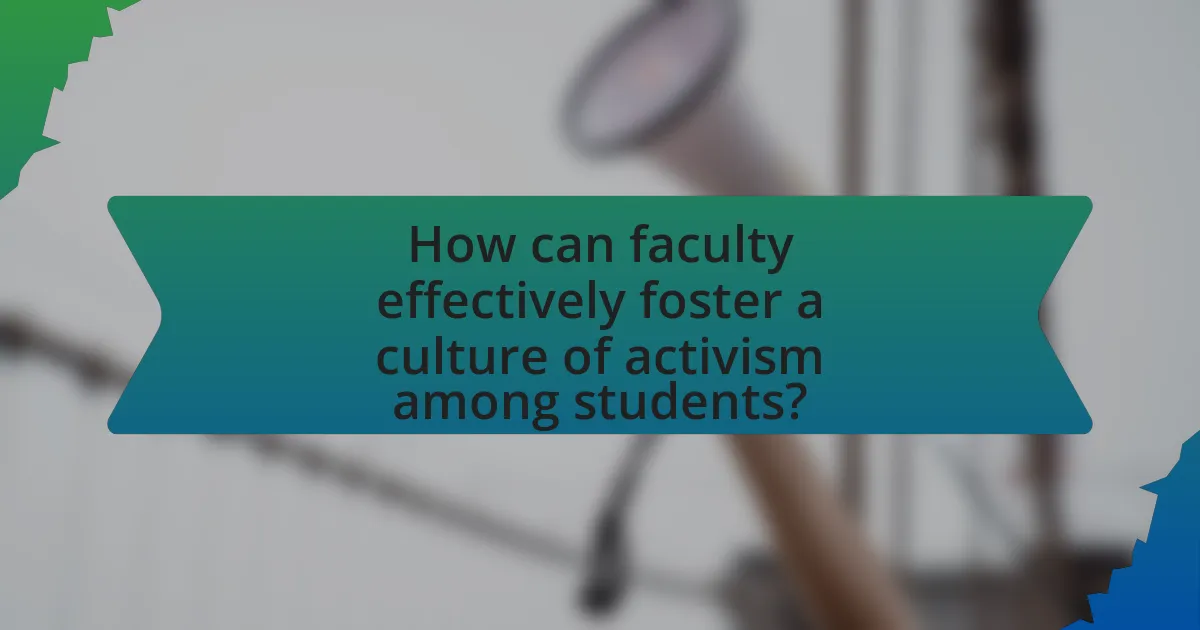
How can faculty effectively foster a culture of activism among students?
Faculty can effectively foster a culture of activism among students by integrating social justice themes into the curriculum and encouraging critical discussions. Research indicates that when educators create an inclusive environment that values diverse perspectives, students are more likely to engage in activism. For example, a study published in the Journal of Higher Education found that courses focused on social issues significantly increased student participation in community service and advocacy initiatives. By providing resources, mentorship, and opportunities for collaboration, faculty can empower students to take action on issues they are passionate about, thereby cultivating a vibrant culture of activism on campus.
What strategies can faculty employ to encourage student activism?
Faculty can encourage student activism by integrating social justice themes into the curriculum and fostering an environment that values civic engagement. By designing courses that address contemporary social issues, faculty can stimulate critical thinking and inspire students to take action. Research indicates that students exposed to discussions on activism and social responsibility are more likely to engage in civic activities (Astin et al., 2000). Additionally, faculty can support student-led initiatives by providing mentorship, resources, and platforms for students to voice their concerns and organize events. This approach not only empowers students but also enhances their leadership skills, as evidenced by programs that have successfully increased student participation in activism through faculty support (Kuh et al., 2005).
How can faculty create inclusive spaces for diverse student voices?
Faculty can create inclusive spaces for diverse student voices by actively promoting open dialogue and encouraging participation from all students. This can be achieved through implementing diverse curricula that reflect various perspectives, facilitating workshops on cultural competency, and establishing ground rules that foster respect and understanding in discussions. Research indicates that inclusive teaching practices, such as collaborative learning and equitable assessment methods, enhance student engagement and representation, thereby validating the importance of diverse voices in academic settings.
What role does curriculum play in promoting student activism?
Curriculum plays a crucial role in promoting student activism by integrating social justice themes and critical thinking skills into educational content. When curricula include topics such as civil rights, environmental issues, and community engagement, they empower students to understand societal challenges and encourage them to take action. Research indicates that students exposed to curricula emphasizing activism and civic responsibility are more likely to participate in social movements and advocacy efforts. For instance, a study by the Center for Information and Research on Civic Learning and Engagement found that high school students who engaged in service-learning programs demonstrated increased civic engagement and activism. Thus, a well-designed curriculum not only informs students but also inspires them to become active participants in their communities.
What best practices should faculty adopt to support student activists?
Faculty should adopt practices such as fostering open dialogue, providing resources, and advocating for student rights to effectively support student activists. By creating an environment that encourages discussion, faculty can help students articulate their views and concerns. Providing access to resources, such as funding for events or workshops, empowers student activists to organize effectively. Additionally, faculty advocacy for student rights, including protection from retaliation, reinforces the importance of activism in educational settings. Research indicates that supportive faculty involvement enhances student engagement and activism outcomes, demonstrating the critical role educators play in this context.
How can faculty provide resources and training for student activists?
Faculty can provide resources and training for student activists by developing structured programs that offer workshops, mentorship, and access to relevant materials. These programs can include training sessions on advocacy strategies, public speaking, and organizing events, which equip students with essential skills for effective activism. Additionally, faculty can curate resource libraries that include books, articles, and online tools focused on social justice issues, ensuring students have the information needed to support their causes. Research indicates that institutions that actively engage faculty in supporting student activism see increased student participation and empowerment, highlighting the importance of faculty involvement in fostering a culture of activism on campus.
What are the key elements of successful faculty-student collaborations in activism?
Successful faculty-student collaborations in activism hinge on mutual respect, clear communication, and shared goals. Mutual respect fosters an environment where both faculty and students feel valued and empowered to contribute their perspectives. Clear communication ensures that expectations, roles, and responsibilities are understood, facilitating effective teamwork. Shared goals align the efforts of faculty and students, creating a unified direction for activism initiatives. Research indicates that collaborations with these elements lead to more impactful activism outcomes, as seen in various case studies where faculty mentorship significantly enhanced student-led movements.
What practical tips can faculty follow to enhance their support for student activism?
Faculty can enhance their support for student activism by actively engaging with students, providing resources, and fostering an inclusive environment. Engaging with students involves attending meetings and events organized by student activists, which demonstrates commitment and solidarity. Providing resources includes offering access to funding, meeting spaces, and mentorship, which empowers students to organize effectively. Fostering an inclusive environment means creating a classroom culture that encourages diverse perspectives and open dialogue, which is essential for healthy activism. Research indicates that faculty involvement in student activism positively influences student engagement and success, as seen in studies conducted by the American Association of University Professors, which highlight the importance of faculty-student collaboration in promoting social change.
